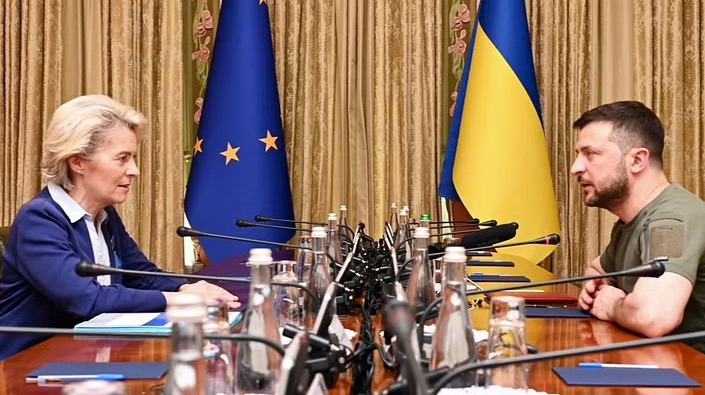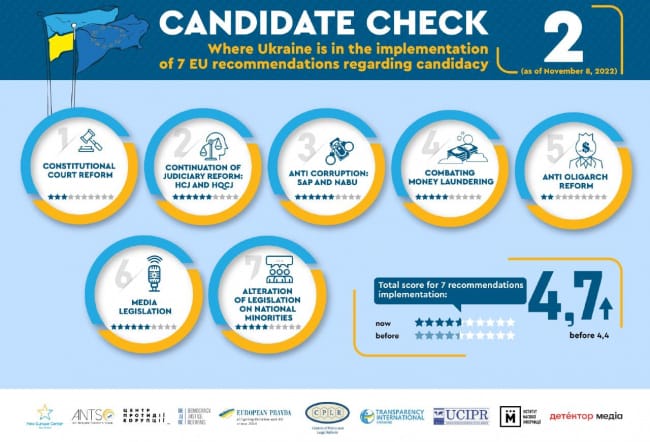Ukraine's Half-full Ambition To Fulfill EU's Candidate Criteria

Not everything is perfect on Ukraine’s journey towards fulfilling EU candidate criteria, but the EU should do more to help, too. This would help Kyiv progress towards EU accession but would also help build a resilient Ukraine despite Russia’s military aggression, write
This piece is eleborated and published as a joint activity of European Pravda and EURACTIV.com.
After winning its candidacy bid in June, Ukraine stepped up its EU integration ambition, striving to open accession talks as soon as possible.
For that, Kyiv aims to implement seven European Commission-defined reforms by the end of 2022 – an internal deadline set by President Volodymyr Zelenskyy, which seemed to be overambitious from the start.
No surprise that after showing tangible progress in the summer, Ukraine found itself bogged down in agreeing on detailed steps with Brussels and in internal discussions.
This slow-down fits the plans of many in the EU, for whom Ukraine’s candidacy came as an unexpected breakthrough decision.
But the government in Kyiv is still optimistic about its high ambitions. The spirit is widely backed – the urgent need to act so as not to miss the historic chance is prevailing in the government, in the parliament, and among representatives of civil society dealing with European issues.
To find out where Ukraine stands, a group of Ukrainian think tanks led by the New Europe Center has monitored the implementation of all seven candidate criteria.
The conclusions are mixed. Ukraine now has a choice: It should either step up reform efforts significantly or agree to shift its internal goals and deadlines to meet the reality. But no less important is to realise that the EU is now also contributing to slowing down Ukraine’s reform drive.
How ready is Ukraine?
Even though survival and winning the war today remain a top priority for Ukraine, the EU integration topic stays essential, with 90% of Ukrainians backing the path toward EU membership. As a necessary step, seven reforms were defined in June in the Commission’s opinion recommending granting Ukraine candidate status.
Meanwhile, the EU is not in a hurry to assess Ukraine’s progress. The first official assessment of the implementation of the seven criteria is scheduled for late 2023.
While Kyiv is holding a dialogue with Brussels to speed up this process, Ukrainian experts are monitoring this implementation, scoring results from 0 to 10 for every criterion.
Four and a half months after obtaining the EU candidate status, the glass is half-full. The average expert score as of the first decade of November is 4.7 points (where zero means no implementation and 10 equals full implementation).
This could be seen as a good result if there were no self-imposed obligations to implement all seven reforms by the end of December.
Even more important is that the implementation has slowed down since September, as the previous monitoring back in August showed 4.4 points, meaning limited progress has been made since then.
And in some cases, Kyiv has all the reason to blame the EU for its lack of progress.

Fifty shades of progress
It should be stressed that Ukraine is implementing the recommendations: In each of the seven areas, some steps have already been taken.
The laws on media, as well as on the Constitutional Court (CC) reform, were adopted in the first reading. This latter issue was an outsider back in the summer, getting a score of 0 out of 10. In September, Verkhovna Rada adopted a draft law on the selection procedure for CC judges, but its implementation has stalled so far (new score: 3 of 10).
Several legal documents dealing with anti-money laundering are being drafted.
Also, experts mark success in strengthening the fight against corruption, where implementation steps have already borne fruit said the expert study. Particularly, the appointment of the head of the Specialized Anti-Corruption Prosecutor’s Office in July this year led to improvement in the effective investigations of top corruption cases.
The anti-oligarch law, which is still to be analysed by the Venice Commission, has also had some effect: Ukrainian businessman Rinat Akhmetov gave up his media business, and ex-president Petro Poroshenko also formally withdrew from ownership of his media assets.
Debunking big business from media control is one of the goals of the anti-oligarch law.
But the glass, being half-full, is also half-empty. In several areas, signals are somewhat mixed.
There is stagnation in law enforcement reform. According to experts, a strategy for a comprehensive reform of the sector could have been adopted as early as September as all documents for it were elaborated – but no decision has been made.
Judicial reform progress is controversial, too.
The High Council of Justice (HCJ) had two members appointed by the parliament in August – widely considered a breakthrough – but further appointments by the Congress of legal scientists caused much concern about the integrity of the appointees.
Yet, despite decisions being somewhat disappointing in some sectors, in others, the progress goes the way it should, with decision-makers taking advice from civil society – like in media sector reform. The draft law on media was discussed with sectoral experts and media actors who contributed to its revision before adoption in the first reading.
On the legislative framework for national minorities, the Parliament has reacted to criticism of the expert community and decided not to register the law before getting the Council of Europe’s feedback about the draft. The ruling majority had initially planned to vote on the law in September.
Five months in, the areas of anti-corruption, judiciary, and media legislation reforms are the most advanced, but no single area is close to the highest mark, meaning full compliance.
All-in-all, the fact that Ukraine is continuing with reforms despite the full-scale war with Russia when even the functioning of state institutions seems an inspiring achievement. But for some in Ukraine, this speed seems unacceptable.
It is not only Ukraine that is hindering reforms
While the study concluded that reforms lost pace after the summer, it must be said that in some fields, the EU has contributed to the slowdown, failing to provide the necessary expertise requested by Kyiv.
Ukraine adopted the draft law on media in the first reading in August and sent it to Brussels for a "quick" examination – and here comes the pause. While waiting for the European recommendations, the parliament could not submit the draft law for second reading. The reply from Brussels was received only in November.
A conclusion on the draft law on national communities is also still being awaited. There’s no word about the "anti-oligarch law", which has been on review by the Venice Commission, an expert body of the Council of Europe, since 2021.
While Brussels rightly says the EU is interested in qualitative reforms by Ukraine, we, as Ukrainian experts, would like to urge European partners not to bury Ukraine’s enthusiasm in bureaucracy.
Kyiv has to do its homework, and we are keen to push for this, but Ukraine and the EU need to be on the same page and move forward at the same speed.
When setting too ambitious internal deadlines, Ukraine had two aims: To demonstrate its commitment and to push the EU towards taking faster decisions.
Not everything is perfect on Ukraine’s side, but the EU should pull its weight too. This would help Kyiv advance its EU accession and build a resilient Ukraine despite Russia’s military aggression.
Marianna Fakhurdinova is a research fellow at the New Europe Center.
Sergiy Sydorenko is the editor of the European Pravda.
